#Gaul is divided into three parts…
Explore tagged Tumblr posts
Text

#1 way to learn the ablative absolute, 2,000 years running
With his memoir having been written, the students suffered Caesar for centuries
#de bello gaullico#julius caesar#commentary on the gaullic wars#Latin#Gaul is divided into three parts…
6 notes
·
View notes
Text
I have to read Book 1 of de Bello Gallico (in English) before school tomorrow it is Killing Me.
#I Do Not Care that All Gaul Is Divided In Three Parts#de bello gallico#gaius julius caesar#school#latin#dante dicit
3 notes
·
View notes
Text
An Illusion || Young President! Coriolanus Snow x reader

GIF by @unknown and divider by @firefly-graphics
Summary: Whispers were circulating the Academy about who the lucky girl was to be Panem’s First Lady, Coriolanus’ soon to be wife, his lover; but little do they know.
Warnings: none
Wc:
Coriolanus Snow Masterlist

From the moment you stepped foot in the Academy, the whispers had already begun. You walked with poise and confidence, the clicking of your heel making heads turn as you tuck a strand of hair behind your ear. You basked in the attention your fellow peers always gave you.
You were Capitol’s darling of course. Coming from a high born, and filthy rich family, everyone knew who you were. “Y/n,” Clemensia nods her head at you with a smile as you do the same, “Clemmie,” “You’re here quite early,” She comments as the two of you walk the halls, “He had an early class so he dropped me off earlier,” You say as Livia Cardew joins the two of you.
The three of you converse in conversation, ignoring the curious glances people would give you. You stepped into Casca’s class, he was late. When moving to your seats, you couldn’t help but eavesdrop the conversations happening around you. “He’s being mentored by Dr. Gaul now. Isn’t that crazy?”
“I would love to be Panem’s First Lady.” “He’s so hot. And he’s body? Training as a Peacekeeper does have its benefits” “I’d love to know what he’s like in bed.” That comment caught you off guard but made you smirk to yourself.
Clemensia and Livia give you knowing looks as you chuckle. “Little do they know,” You say to yourself as the girls giggle quietly to themselves. “Quiet down, Quiet down everybody” Casca came in rushed and class began.
After lunch, the whispers had seemed to intensify. “The Academy is going absolutely crazy,” You shake your head as you eye groups of students talking in hushed tones as they glance at you.
In your head, all you were thinking about was the moment you were able to show Coriolanus Snow as yours. And you, his. The satisfaction of watching everyone envy you was itching your brain. “When is this day going to end,” You mutter to yourself, rolling your eyes.
Finally, the school day had ended. You accompanied Clemensia and Livia to Professor Crispus to drop off their essay before walking outside where a crowd had formed. “What is going on?” Livia questions as the three of you walk towards the crowd of students.
Once people saw your presence, they make room for you to see the front. And there he was. Coriolanus Snow. Your Coryo. He was leaned up against the car, his head turned to the side. His eyes finally land on yours, the corners of his lip turning up as he smiles at you.
“Sweetheart.” And that was enough for everyone to start gasping and watch in shock at the pet name Coriolanus gave you. Your cheeks began becoming hot as you smile and move closer to him. Even in heels, you still had to go on your tippy toes to wrap your arms around his neck as his hands place themselves protectively on the small of your back.
You kiss his cheek as he kisses your hairline. “Clemmie, Liv,” He politely greets your best friends and his friends as they both nod back with a smile. “She’s so lucky,” “Of course she’s dating him,” Whispers began once again. “We should go, wouldn’t want to keep your presents at home waiting,” Your eyes lit up at his words and you nod.
You wave to Clem and Liv before Snow opens the car door and lets you in. He closes the car door, moving the curtains so it covered the window. “Really? Presents at home?” You scoff, crossing your arms as you move away from him. “They’re going to think I’m a spoiled brat,” You harshly say.
Snow rolls his eyes. “With that attitude you are, Princess,” He mocks as you shoot daggers at him. He sighs, massaging his forehead. “It’s true, you know,” You turn your head to him with narrowed eyes. “What’s true?” “There’s presents at home waiting for you,” Your lips part as you watch him, a sense of sadness? Was etched into his face.
#coriolanus snow angst#coriolanus x reader#coriolanus snow x reader#the hunger games#the hunger games the ballad of songbirds & snakes#tbosas#cariolanus snow#president snow#coriolanusimagine#coriolanus x you#coriolanus snow fanfiction#coriolanus fanfiction
2K notes
·
View notes
Text
❝ꜱᴏᴜʟꜱ ᴛᴏ ᴄʀᴜꜱʜ❞ — chapter six | coriolanus snow




「ᴡᴀʀɴɪɴɢ:」 SFW | mentions of death, Coriolanus, Dr. Gaul, some parts of this chapter are directly taken from the original book!
「ᴘᴀɪʀɪɴɢ:」 young! Coriolanus Snow x fem! Reader
「ꜱᴜᴍᴍᴀʀʏ:」 Arachnes' funeral, Coriolanus and you bonding on the rooftop <3
「ᴀ/ɴ:」 hello! Chapter six!! This was finished quickly because some of the paragraphs and quotes are directly from the books and we're finally peeling the layers that reader has, how we feeling about that?
Beta read by the SUN @nowitsmissing
series masterlist | navigation


It was time for Arachnes' funeral. Although it was Saturday, the entire student body reported to homeroom before they assembled on the front steps of the Academy, divided neatly and alphabetically by class. By his assignment, Coriolanus and you found themselves in the front row with faculty and distinguished guests, first and foremost President Ravinstill.
The Academy and the surrounding buildings were festooned with funereal banners and sported Capitol flags in every window. Numerous cameras were positioned to record the event, and multiple Capitol TV reporters streamed live commentary. Coriolanus thought it was quite a display for Arachne, disproportionate to both her life and death, the latter of which could have been avoided if she’d refrained from being such an exhibitionist.
Both Coriolanus and you were wearing black suits with a symbol of Panem embroidered on the suit pocket. Coriolanus was made to sing in front of everyone. It was thanks to his grandma’am and her rules that he sailed through all the notes with a breeze. He received applause from the crowd and an approving nod from the president. He sat down again beside you.
Neither of you had spoken to each other other than the greetings. He hated to admit it but it made him jumpy. He wanted to hear you say something, anything, especially with the fact you had the upper hand with Dr. Gaul with the act you have planned for the funeral. It was impressive despite the initial horror he felt reading it. It was a strategy that would work perfectly with the times.
Now it was time for the show.
The president, who now took the podium, began, “Two days ago, Arachne Crane’s young and precious life was ended, and so we mourn another victim of the criminal rebellion that yet besieges us,” the president intoned. “Her death was as valiant as any on the battlefield, her loss more profound as we claim to be at peace. But no peace will exist while this disease eats away at all that is good and noble in our country. Today we honor her sacrifice with a reminder that while evil exists, it does not prevail. And once again, we bear witness as our great Capitol brings justice to Panem.”
The drums began a slow, deep boom, and the crowd turned as the funeral procession rounded a corner onto the street. Although not as wide as the Corso, Scholars Road easily held the honor guard of Peacekeepers, standing shoulder to shoulder, twenty wide and forty deep, that stepped in flawless uniformity to the rhythm of the drums.
Behind the Peacekeepers came a long flatbed truck with a crane affixed to it. High in the air, the bullet-ridden body of the District 10 girl, Brandy, dangled from its hook. Shackled to the truck bed, looking utterly filthy and defeated, were the remaining twenty-three tributes. The length of their restraints made it impossible to stand, so they either crouched or sat on the bare metal floor. This was just another chance to remind the districts that they were inferior and that there would be repercussions for their resistance.
Another battalion of Peacekeepers followed the tributes, paving the way for a quartet of horses. They were decked in garlands and pulled an ornate wagon with a pure white coffin draped in flowers. Behind the coffin came the Cranes, riding in a horse-drawn chariot. At least her family had the decency to look uncomfortable. The procession halted when the coffin drew up in front of the podium.
Dr. Gaul, who’d been sitting next to the president, approached the mic. Coriolanus thought it was a mistake to let her speak at such a moment, but she must have left the crazy lady and her pink snake bracelets at home because she spoke with a stern and intelligent clarity. “Arachne Crane, we, your fellow citizens of Panem, vow that your death will not be in vain. When one of ours is hit, we hit back twice as hard. The Hunger Games will go forward, with more energy and commitment than ever before, as we add your name to the long list of the innocent who died defending a righteous and just land. Your friends, family, and fellow citizens salute you and dedicate the Tenth Hunger Games to your memory.”
He hated how impressed he was about the fact all of this was your idea. How much he felt proud of you that you managed to spin this around for the Capitols' benefit. He turned to you, on the tip of his tongue a congratulations resting but you were looking down on the ground as if trying to keep yourself from getting sick. Coriolanus found himself shockingly concerned.
“Are you okay?” He whispered.
“As good as I can be,” you seem to choke out before getting out of your seat and leaving the funeral early. Coriolanus looks around and realizes he won't be missed if he leaves either so he follows you inside the academy. You move around the hall without knowing he is trailing you. And then both of you soon reach the roof, forbidden but who cares? He doubted Dean Highbottom could give him any sort of punishment during a funeral, it wouldn't look good.
“What's wrong?” He asked, worried. His face was etched in a frown. What was there to be sad about? You made it pretty clear that you weren't mourning Arachne Cranes’ death. Was it something else?
“I didn't think she would do it,” you said, turning around to face him. Your eyes filled with tears. “It was a joke. A cruel joke of turning her into the rotten spectacle she always was. I didn't think- think-”
You were so contradicting. It was confusing to him. “But you said everything you wrote was for Panem,” he said, his confusion sweeping in his voice and his eyes.
You scoffed, “Would you rather have me admit it was because I wanted to be a bitch? Because… that was me being dramatic, I didn't expect it to be reality. It was disgusting. It was cruel. It came from my head.”
A sob escapes your lips and it makes Coriolanus frown harder, feeling irritated by you. He clenched his jaw before calming himself down. He walked towards you, standing right near you.
He said, “Real or not?” Because you were a performer, in a different way from Lucy Gray but a performer nonetheless. He needed to know if this was fake or not.
You furrow your eyebrows before realizing his question. You wiped away the tears that fell, trying to stop yourself from grinning. You failed, an amused snort leaving your lips.
“Not,” you answered, truthfully. “Let's just say I was practicing for the after-party.”
Coriolanus nodded, despite his mind being overwhelmed. Was it bad that he thought it was hot how easily you switched faces? And he loved how he could now see through your sweet persona and the real you, his soulmate. He couldn't blame you for being like a snake as he one himself, but he was stunned at how you had fooled him for the past eight years as well.
“Perhaps I should too,” he replied, now with a smile.
“Was that obvious?” You pouted, “I thought my acting had gotten better.”
Coriolanus chuckled, “Oh no. It was impeccable. But you said you were a performer after all. That's how I figured it out.”
You nod in reply. A comfortable silence falls as both of you look all over the Capitol. The sun was shining brightly over the roof and Coriolanus could feel the heat. He took his suit.
“I am glad,” you begin to speak, taking Coriolanus' attention away from the sky. “That you know when I am acting… it makes me feel better that at least you get a show. That you now know… when I am performing or not.”
Coriolanus Snow doesn't know how to reply to that, especially with how his heart skipped a beat from your words.
You grin at him, your shoulder nudging his shoulder. “I am glad to somewhat call you my first real friend, Coriolanus.”
“Why did you come to the roof?” He asked, instead, changing the topic. Too much was changing for him, too soon. He was your friend now? What a… He liked it. He lets himself admit that he liked being your first friend. You were different from your district blood, and you were better than most Academy students too.
“I needed a time out,” you said, “I can't believe they called Arachne a hero” You rolled your eyes, “If she's a hero, Dr. Gaul is a saint and Dean Highbottom is not high.”
He lets out a laugh at your words. “Maybe her gravestone could read, ‘Casualty of cheap laughs.’”
You laugh out loud too, and he wanted to bottle the sound, hide it from the world. Because who else was deserving of your laughter if not him?
“Come on,” he said, his hand holding your arm before it slid down to hold your hand. He barely hides the pathetic sound that escaped when you interlocked his fingers with yours. Both of you acknowledge something to each other.
“We need to head to the interview soon.”

NEXT PART
#character x reader#x you#x reader#x female reader#fem reader#scenario#president coriolanus snow#coriolanus snow x reader#coriolanus x reader#coriolanus smut#coriolanus snow smut#coriolanus x you#young coriolanus snow#coriolanus snow#coriolanus snow x reader smut#coriolanus snow x female!reader#coriolanus snow x you#snow x reader#dystopian fiction#the ballad of songbirds and snakes#tbosas fanfiction#tbosas#thg tbosas#tbosas x reader#the hunger games x reader#the hunger games#thg x reader#thg fanfiction#tom blyth#thg series
572 notes
·
View notes
Text
Ukraine Russia ConflictPart three, the Kievan Rus
Ok so where did this conflict start? To understand that, we need to go back to the 9th century, where records are short, legends are long, and nationalists search the seas for mythological times to pine back too. Welcome to Kievan Rus, aka Ruthenian, aka Svitjod the Great, aka Svitjod the Cold, aka “The place where Russian and Ukraine both trace their origins to this point.
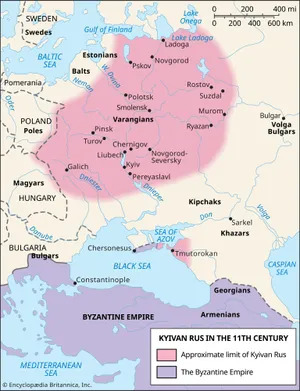
If anything, this map makes things too clean
But before we talk about the Rus, we need to talk about “Periodization”. Periodization is one of the most important concepts about being a historian, it's the dividing the past into distinct parts so it can be easier to understand. If you’ve ever studied Japanese History and are looking at the “Edo Period” or the ‘Showa Period” that's periodization, it's cutting up the past into distinct units. Periodization is in many ways necessary to understand the past, you can’t study all of it or you will go mad, but it can create these divisions in time which don’t necessarily exist naturally. A great example of this is the Early Modern Period, which historians use to highlight the development of the trends that will eventually emerge into the modern world. The slow rise of capitalism, the slow death of feudalism (except in Russia), the downfall of the hegemony of the Catholic Church, the start of mass media, the first movements towards industrialization, the rise of the first global colonial empire and the creation of modern states. It’s a very useful framework to understand the changes that happened in the 16th, 17th, and 18th centuries. However, if you are a random Hanoverian peasant, as far as you know, there isn’t any difference between 1491 and 1492. Time periods are useful but they aren’t ironclad things, like money, it's an illusion, just a functional and useful illusion.
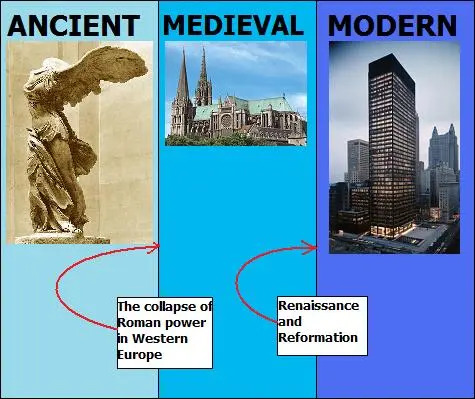
nice and simple
The reason why that tangent mattered is that when it comes to what is called “National History”. So you have a nation right, a whole new cool nation. How do you make sure everybody is part of this nation? Oh well you have public schools and in those public schools you have textbooks which teach the history of your country, how neat is that? So..where do you start? History is long and it can be difficult to teach. Like if the US finally got a national history curriculum, where would you start? People have lived in the lands of the United states since at least 10,000 BCE, do we start there? Do we start with the first European arrival in the colonies? These aren’t neat or easy to answer questions, debates over “where do we start our history” can get really intense. A lot of French history books will teach the Gauls to be like “look, these are our ancestors” but there is literally a thousand years separating the conquest of Gaul from the Emergence of France.

Utterly uncomplicated in every way
Periodization matters for our purposes because both Ukraine and Russia point to the Kevian Rus as “the start of their civilization.” and while the events of the late 9th century shouldn’t be affecting us today, apparently it does.
Another note is that the Kevian Rus is a bit hard to document due to the fact that the people didn’t have a writing system, so what we know comes from archaeological evidence and outside sources, so the make up and borders of this region is a bit hard to define with certainty but fuck it lets go.
The Kievan Rus consisted of most of central and eastern Ukraine, Belarus, and the western chunk of Russia, and as the name implies it was based in Kiev, what is today the capital of Ukraine, though it wasn’t known as the Kievan Rus at the time, it was called the land of the Rus (due to the ruling Rurik dynasty) or just “Rus''. The earliest version of the word Russia refers to the eastern half of the Kievan Rus, while the western half (what is today Ukraine) was known as Ruthenia. Since its origins are the stuff of legend, it might have been founded by Norse traders, or Norse people were invited to rule, or a bunch of Vikings settled peacefully in the area, it's a huge flame war among nationalists that isn’t relevant other than to show how much people still care about this area. The Rus was a major trade network in the area and it was more of a loose confederation of city states rather than a strong centralized empire.
Most relevant to our story is there relationship to the Byzantine Empire

Byzantium at its largest extent
TANGENT TIME. The Byzantine Empire was never called that during their time, they always thought of themselves as the Roman Empire. When Constantine the Great converted the Empire to Christianity, he moved the capital to the new city of Constantinople (famously the modern city of Istanbul). A century or so later, the empire split into East and West, with the East being seen as the greater and more powerful of the two. The Western Roman Empire fell in 476 AD, the east just…kept on going until 1453. No I’m not kidding, this matters for understanding Ukraine, those Zelensky memes were created in the legacy of Justinian the Great, keep watching. As mentioned earlier, Western Empire goes Catholic, the Eastern goes Orthodox, and after the west falls, the Eastern Roman Empire keeps on going. We call it the Byzantine Empire for…complicated reasons I might explore some day. Anyways, by the time of the Kevian Rus, the Byzantines are the supreme cultural, military and most importantly economic power of Eastern Europe, and the Rus are basically massive fucking simps for them. Like “please notice me Patriarch senpai '' simps. They even played a major role in the Varangian Guard, the personal bodyguards of the Byzantine Emperor.

The Rus were pagan at the time, a mix of the norse pantheon and the Slavic pantheon (pagan religion is complicated and deeply synthetic, I might talk about that in another post), but due to its location it always had Christian, Jewish and Muslim minorities, but it should come as no surprise that in 988 Volodymyr the I or Vladimir the Great converted the kingdom to Christianity, and due his taking a Byzantine bride and thus marrying into the Imperial family, it was of course Orthodox Christainity, thus starting over a thousand years of Orthodoxy in the region. Anyways, eventually all good things came to an end and by the 12th century it suffered the weaknesses of feudal confederacy (succession crisis) and had largely broken apart in all but name, as local feudal lords sort of went their own way. This is where the Russian/Ukrainian split first sort of not really occurs, the informal overall Rus still exist but you get these smaller Rus within it, the Novgorod Rus, the Moscow Rus, the Vladimir Rus. But the distinction between the various Rus comes to matter less than you’d expect because suddenly…MONGOLS

I really can’t empathize enough how big of a deal the Mongols were on the world stage, and probably one of the few legitimate examples of the Great Man theory of history proving true. Temujin’s abandonment issues eventually result in an empire which destroys the Status Quo of the Eurasian world, and leads to the largest continental empire in history. In the Mid 13th century, Temujin, later known as Chiggis Khan (Ghengis Khan to the West) would create the most terrifying military machine in history to that point, which would wipe out whole civilizations. So suddenly all these Mongols show up and wipe out…basically everything. The Rus? Gone. The Civilization that originated both Russia and Ukraine is now definitely gone for good. The Mongols keep the East, which becomes part of the “Golden Hoard”, while the west reforms as the Galician-Volhynian Principality, and eventually gets eaten by Poland and Lithuanian.
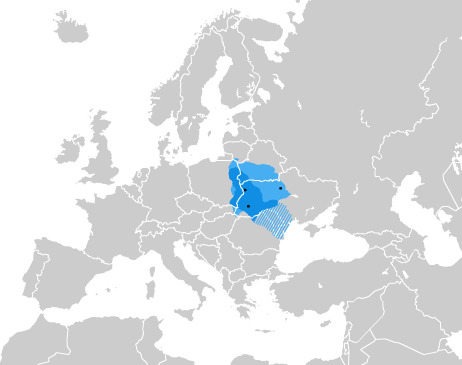
Now there have been entire series of books written about the culture, political structure and history of the Kievan Rus but what matters to us is its legacy in the historical memory of Slavic nationalists, the Rus is considered the origin point of both Russia and Ukraine, and many Russian nationalists feel that Kiev is there birthright. For Americans, this can be a bit hard to imagine because the US has never lost major territory in its history but imagine if Pennsylvania became an independent nation, and now we have all these places of national significance in another country. Hell we can take this further, Imagine if the East Coast became independent, and Texas history books talk about the founding of the US, but all of the places where the US was created are now outside there territory. Now that isn’t a justification, “oh my ancestors once lived there so I get to invade’ is stupid. Also the later Principality of Moscow and the Princedom of Galicia-Volhynia will each claim to be the “true” heir to the Rus, in a manner very similar to the Holy Roman Empire actually. This isn’t the only thing causing the conflict, but nationalist fanfiction about the origin of the Slavs still plays a major role in modern politics. This also is a big part of why Russian nationalists don’t consider Ukraine a thing, to them Ukraine is just a different part of Russia with funny accents, not their own nation with their own history. The Russian conquest of Ukraine (the first one) was presented as a reclaiming of traditional Russian land, not the taking of a foreign land.
Next time, Russian history, because nothing says “I’m going to explain the conflict in Ukraine” like spending most of it on Russia.
#neglected historical fact#Russia#Ukraine#russo ukrainian war#kievan rus#Byzantine Empire#Mongolian Empire#Orthidox Church#The Rus#Varangian guard#Vladimir the Great#Golden Hoard#Ruthenian#genghis khan
6 notes
·
View notes
Text
Feast Days: Martinmas
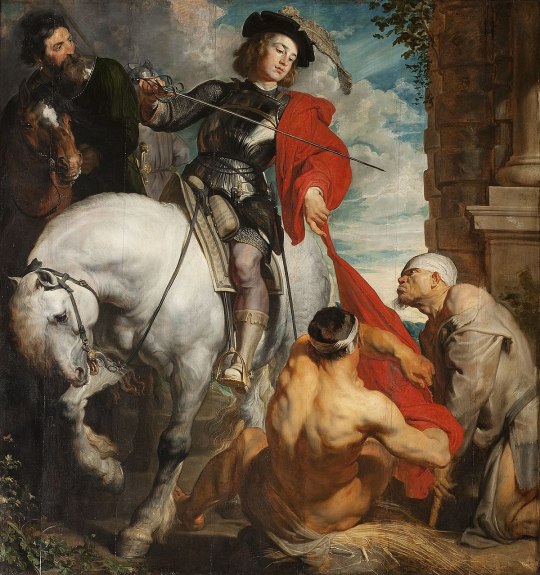
Anthony Van Dyck ~ "St. Martin Dividing His Cloak" (c.1618)
Happy Martinmas!
Today marks the feast day of St. Martin of Tours, who was bishop there from 371 CE until his death in 397 CE. He is the patron saint of many things, including: against poverty, against alcoholism, the poor, cavalry, Buenos Aires, quartermasters, wool-weavers, soldiers, and tailors, as well as wine growers, makers, and sellers. Whew! He must be very busy.
Keep reading for info about his life, a snitch goose, where the word 'chapel' came from, and how to tell what the weather will be like at Christmas.
His Life
Much of what we know about Martin comes from his hagiographer, Sulpicius Severus, who includes some 'artistic license' that is common in chronicles of the time, and therefore must be taken with a grain of salt.
Martin was born anywhere from 316-336 CE in Savaria, now Szombathely, Hungary. His father was a senior officer in the Roman Army, and as such was given land in northern Italy for his retirement. At the age of 10, Martin attended a Christian church against the wishes of his parents, and became interested in Christianity. Because of his father's status as a veteran, he was required to join the cavalry at 15. Dates surrounding his military service are shaky, but Severus states that, during his time stationed in Gaul, he was riding on horseback when he encountered a poor man with threadbare clothes. Having compassion on him, Martin used his sword to cut his own woolen cloak in two and gave the other half to the man. That night, Jesus Christ appeared to him in a dream, surrounded with angels and wearing half of the cloak. After this, Martin was baptised as a Christian. Though other miracles of his are recorded, this tale is the one most associated with Martin's life. It fits in with depictions of God or his angels in disguise as a beggar, traveller, &c., and is also a narrative found in many other religions and traditions. (Biblical examples include Abraham feeding the three angels in Genesis 18).
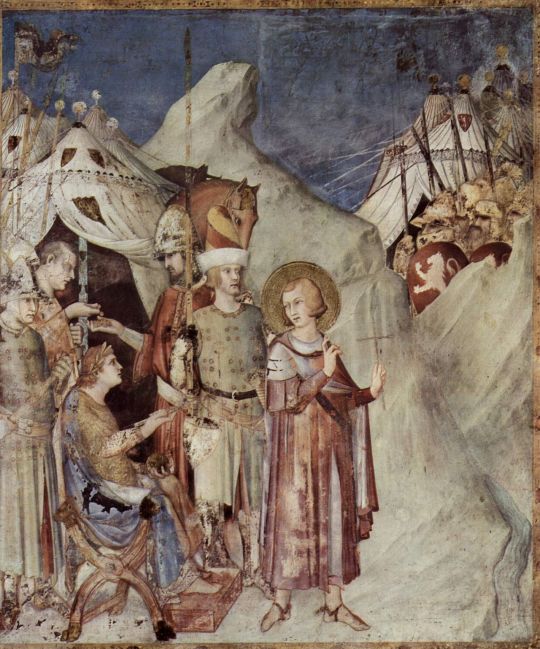
Martin dips from the army ~ fresco by Simone Martini (c.1320s)
With his new faith now firmly a part of his life, Martin decided to leave the army. Before a battle near modern-day Worms, Germany, Martin went before Emperor Julian and refused his salary, saying, "I am the soldier of Christ: it is not lawful for me to fight." They threw him in prison for this, but due to ye olde extenuating circumstances, he was released and discharged without further incident.
Martin made his way to modern-day Tours in France and declared himself a hermit, becoming a disciple and friend of Hilary of Tours. Because Christianity was Not OK™ in the Roman Empire, he and Hilary faced a lot of discrimination, including corporal punishment and exile. After converting his mother to Christianity and having numerous adventures, like living pretty much alone on an island, he and Hilary settled down in and around Poitiers, where Martin established Ligugé Abbey. It is the oldest known monastery in Europe! Martin made it his home base while he preached throughout western Gaul.

In 371 CE, the bishop of Tours died, and Martin was considered a good candidate for a successor. However, he liked living as a hermit and monk, and they resorted to tricking him into coming to Tours and then forced him to become the bishop. Legend holds that he tried to hide in a barn, but a honking goose gave him away. Hence he is the patron saint of geese, which I think is adorable. Martin proved true to his hermit ways, living very simply in huts with his monks. He established a rudimentary parish system, through which he visited different Christian communities and established monasteries. He was very determined in his efforts to convert local Pagans, as well as protect Christian institutions from unfriendly sects in the area, and in some cases he was successful. He died in 371 CE, already a venerated man. His popularity was ensured by his adoption by various French royals and by the Third Republic as a national symbol.
Martin has been portrayed by several famous artists, including Van Dyck, Peter Bruegel the Elder, and El Greco. He is usually portrayed on horseback, dividing his cloak for the poor man, though occasionally he can be seen riding a donkey. This references another story in his life about the time where he met the Devil and outwitted him. It also connects him to the image of Jesus riding a donkey into Jerusalem (recounted in Mark 1:1-11).
Martinmas and its Traditions
Martin lent his legacy to a host of English words and phrases, including those relating to the word 'chapel'. Temporary buildings that held the relic of his cloak (cappa in Latin) were referred to as cappella, and hence the word 'chapel' was born. A similar thing happened to the word 'chaplain', which derived from the word for the priest in charge of the cloak.
Though the Anglo-Saxon church did celebrate St. Martin to some extent, more references to Martinmas celebrations begin to crop up after Norman Conquest of 1066, when the Frenchman William the Conqueror invaded England. Supposedly, he promised to build an abbey dedicated to Martin if his invasion of England was successful. William was very likely familiar with the early Mediaeval association of the battle-hungry rulers of France with St. Martin, and was possibly responsible for his increased popularity in England.
In England and Scotland, and indeed through much of western Europe, Martinmas became a celebration marking the culmination of the harvest and the beginning of winter. From the late fourth century through the late Middle Ages, it also served a similar purpose to Mardi Gras/Carnivale: a period of fasting was ordained for the day after Martinmas through Christmas, so Martinmas was your last chance to stuff your face for a long time! (This period later became Advent, though with much laxer rules). As such, it was a time for feasting, celebration, bonfires, getting really drunk, and even events such as bull-running, as in Stamford, Lincolnshire. It was also a time for the end-of-harvest tasks, such as sowing winter wheat and slaughtering pigs and cattle. An old English saying goes, "His Martinmas will come, as it does to every hog", meaning, "they will get their comeuppance" or "everyone dies someday". Due to Martin's association with geese, some celebrated with a roast goose, but in Britain particularly it was also popular to eat salted pork or beef. For those not rich enough to have a goose, a duck or hen would also suffice. Other traditional fare included black pudding, haggis, and the first wine of the season.
On the business side of things, Martinmas served as a quarter day in Scotland and in parts England. A quarter day was one of four days on which major legal business was conducted. Servants and labourers would be hired or let go, rent was paid, contracts would begin or end, &c. Hiring fairs would be held for agricultural labourers seeking employment, and there would also be entertainment, food, trading, and other scenes of merriment. One of the most famous Martinmas fairs was at Nottingham in England, which lasted eight days.
Like many other English holidays, there is weather folklore associated with Martinmas. To have a warm fall and winter is to have a "St. Martin's Summer". If Martinmas proves an icy day, Christmas (or the rest of the winter) will be very warm. The rhyme puts it more pithily: "If the geese at Martin's Day stand on ice, they will walk in mud at Christmas".
If you stand at the back of the church and observe the congregation on Martinmas, those with a halo of light around their heads will not be alive by next Martinmas.
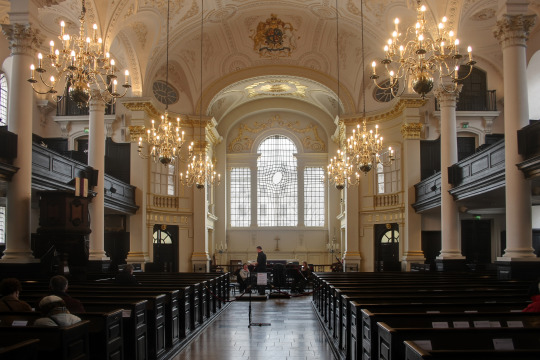
Interior of St. Martin-in-the-Fields, with a funky window!
The church of St. Martin-in-the-fields in Trafalgar Square in London is named after Martin. Many people commemorated there are associated with his anti-war sentiments -- these include Vera Brittain, a memoirist and pacifist; and Dick Sheppard, founder of the Peace Pledge Union. The church also supports houseless and vulnerably housed people.
The holiday gradually fell out of practice due to the English Reformation (when England split from the Catholic Church throughout the 1500s) and the Interregnum (Puritan republican government, 1649-1660). The observance of Armistice Day on the same day largely overshadowed the holiday in the UK, though many regions in Western Europe still take part in traditional festivities.
Martinmas is celebrated on 12 October in the Eastern Orthodox Church.
If You're Still Interested...
"The Life of St. Martin" by Sulpicius Severus himself! (pdf)
Pot Roast Martimas Beef Recipe by Chatsworth House
Sources
Historic UK
Wikipedia (Martin of Tours)
Wikipedia (St. Martin's Day)
Fisheaters.com
The Encyclopedia of Saints by Rosemary Ellen Guiley
"Medieval English "Martinmesse": The Archaeology of a Forgotten Festival" by Martin Walsh (via jstor)
#feast day series#feast day#martinmas#st martin#martin of tours#history#cultural history#english history#british history#saints day#folk history
21 notes
·
View notes
Text
Provence
collected notes on the polity of Provence.
Provence (Docian Proença /pʀuˈɛ.sɔ/) is a polity in the south of Gaul [France] on the Middlesea [Mediterranean] coast. It first became independent in 1499, and its capital city is Marsella [Marseille].
Toponymy
The name Provence descends directly from the Latin name Provincia Romana, so called as it was the first Roman province to be established on the Gaulish side of the Alps. The name of the polity's predominant language, Docian, derives from the division of the French languages into the lengas d'oil (Northern, including Roun [Rouen] and Paris French) and the lengas d'oc (Southern, including Vascon and Docian) depending on their word for "yes".
History
Medieval Provence was a vassal of various greater powers for almost a millennium. It was incorporated into the expanding Francian Empire in the sixth century and remained part of its western fragment after the empire was divided in two in the ninth. By the early eleventh century it had become mostly autonomous, but it was conquered once more as the last piece of the First Drengot Empire.
After the 1170 Emergency at Dijon, the Kingdom of Burgundy left Drengot control, taking the country of Provence with it. Provence was elevated to a duchy in the thirteenth century under the house of Savoy, and as the direct link between the capital at Geneva and all of Middlesea sea-trade, it became known as the panier de Borgogne (the 'Burgund breadbasket'). Provence was conquered by Vascony during the Vascon Ascendancy of the early fifteenth century, but was returned to Burgundy during the reign of Ambrose III in 1494.
Along with this political turmoil, the late fifteenth century saw extensive piracy in the Middlesea; in Marsella the raiding verged on occupation, and many of the wealthy fled to safer pastures inland. Aid requests presented to Rudolf VIII went largely unanswered, and things came to a head on the 21st of June 1497 when Daniel Menton (Lord Amigòt) led the local aristocracy in declaring independence from Geneva (to this day the 21st of June is a national holiday in Provence). The War of Provincial Independence lasted two years until Burgundy's defeat at the Battle of Margès.
Daniel Menton led the new republic for the next eighteen years, manoeuvring against a hungry Barcelon and their piratical allies who de facto ruled Marsella (it is generally understood that Lord Amigòt established Marsella as the capital of Provence in large part to closely monitor Jondumal's fleets). His successor and cousin, Antoin, ruled for only three years despite the guidance of his mentor and Daniel's friend Guillèn daus Sanz; the coming of the Second Great Dying ravaged the Amigòt dynasty and the Provincial people both.
The following decades saw independent Provence take its place as a preeminent mercantile republic. By the end of the sixteenth century their trade network reached across the Atlantic to port towns in Mendeva [North America[ like the newly-established Santrafew. These towns would eventually coalesce into the territory of New Provence.
By the end of the nineteenth century, the power of New Provence had eclipsed that of its Vetomundine progenitor. As the Drengot Collusion formed to the north, Provence became in many respects a European outpost of New Provence, in a reversal of their respective statures centuries earlier. The region stood with Vascony as a bulwark against Drengot hegemony until the Furore of 1961 and the collapse of the Drengot Collusion.
References
The Latin Republics: Jewels under Tyrian Standards by Jacob Trelaune, published by the Yievle Brethin Primers, 1902
5 notes
·
View notes
Text
Round 1 Poll 22
Gallia est omnis divisa in partes tres
"Gaul is all divided in three parts," the whole of Gaul is divided into three parts
The opening line of the De Bello Gallico by Julius Caesar. I am submitting this line for all the italian high schoolers taking latin that have been scarred for life by this subject, all beginning with this singular line. I could recite it in my sleep. After a few years, i could easily monologue the entire paragraph it is taken from. It stays to this day deeply embedded into my psyche, never to part.
Propaganda and translation for Aurora borealis by me
#tournament polls#latin phrases showdown#latin phrases#round 1#gallia est omnis divisa in partes tres#aurora borealis
12 notes
·
View notes
Text
a few days ago i saw (and reblogged) this fan comic of coryo staying with lucy gray and becoming an old man yelling at birds and in it katniss peeta and gale are together and friends and pulling pranks on that old man who yells at mockingjays and it has not left my mind ever since... like the implications that coriolanus living his life in district 12 instead of becoming president led to the three of them being friends at a young age (they look about 13-15 in the comic)!!!
obviously we know from ballad that it would be a much kinder panem as we know from tbosas that many of the worst facets of the games were snow's ideas or shaped by snow's experience but like... how far does that go? did the games eventually die out as Gaul feared they would due to lack of interest? they definitely didn't have any quarter quells. the games absolutely wouldnt be a spectacle. the taking out more spots in the reaping in exchange for tesserae probably wouldn't exist, we know that was snow's idea, so then there wouldnt be as much divide between classes. lack of monetary prizes would mean less discord between districts too.
maybe katniss and peeta were childhood best friends, becuase her mom and peeta's dad were friends as kids, they wouldnt be separated by class as they were in canon. i imagine katniss and gale's dads still died in the same explosino (i don't really like the theory that it was intentionally blown up because of "rebelling miners"), and they'd probably still meet as they did before in the woods. maybe in this version katniss's mom would have been able to afford the medicine she'd have needed to not be as affected by her depression. maybe her family's wellbeing didnt rest solely on katniss's shoulders, maybe she just hunted for extra food.
did sejanus live? was he the one who helped coryo fake his death or something so he could live with lucy gray? highbottom definitely lived without coryo in the capitol to poison him. also just where in tbosas did canon diverge to get to the end result of old man coryo screaming at birds? was it during part 1, part 2, part 3? did it even diverge before tbosas starts, with dean highbottom tkaing coryo under his wing instead of having beef with a high schooler for something his dad did? idk but ive been thinking about it a lot.
9 notes
·
View notes
Text
tbosas thoughts lol
it's been a while since i consumed anything related to the hunger games. i remember borrowing the books from the university library and enjoying them very much, especially the first one! at the time, i never thought a book could feel like a mini series unfolding before me. cliffhangers were the best parts in every chapter.
i wasn't really hyped with this because i was looking forward more on saltburn, poor things, wonka and the like (which would probably be released here next year). fast forward to last saturday and i met up with a friend to watch it. i have a vague idea on what the film is about (it's about coriolanus snow and lucy gray baird that's it lol) but i'm glad i went in semi-blindly. i didn't read the book!
the length. i saw the actual book and i'm surprised they didn't chop it into two parts like its predecessors (hp, breaking dawn, etc). i'm glad about that because franchises can be so blatantly cash grabs these days. it was divided into three parts which was a little surprising since i have not watching something like that in a YA film (let me know if there are other YA that has done this). was it written in three parts in the book as well? the film was almost 3 hours long and we were glued to our seats. no breaks!
the acting. it's my first time seeing rachel zegler act and miss ma'am ate it up. i even forgot why the internet was angry at her. that singing scene when she was reaped? EAT YOUR HEART OUT, CAPITOL! tbh her singing made me feel a little little cringe but heyyyyyyy what do i know? the internet says it's part of lucy's character (she's part of a band for pete's sake, self!) she sings well and i hope i can hear her more in the future.
it's obvious how viola davis is enjoying her role and love that for her!!
peter dinklage gave us dystopian dr. gregory house (compliment) (morphling, vicodin...) and that picture of him with the rubber chicken. work.
my white boy of the month, tom blyth. chef's kiss. that man ate up his blond wigs and buzzcut and i never thought i'll have a crush on a blond man again after matthew crawley. his performance as snow made me feel what god intended: make me feel safe then push me from that beam-- snow landing on top of me with (my) blood on his hands.
sejanus...well, first of all, why suzanne? why the name? janus could've been fine already. (what's with names ending with anus!) we love our human rights king! josh andres rivera's take on sejanus is a breath of fresh air in the middle of capitol's cruelty and nonchalance to it. the anger that he gave to the character would make you wish for a better future for panem's children.
lucky flickerman. jason schwartzman did not hear "cut!" he heard "cunt!" and he gave us that. "smile. that's why we have teeth" is an instant classic for me. i could watch an entire compilation of his scenes on youtube for a whole day and not get bored.
last but not the least, hunter schafer as tigris? i totally get now why tigris smiled at the idea of katniss killing snow in mockingjay. you fed the boy, you dress the boy, and he fires you? fuck off, snow! snow melts anyway!
the costumes. it has a mixture of the elements of turn of the century america. influences from the 30s-50s are evident to the costumes and i love it. very different from the costumes in the hunger games trilogy. it added to the sense of separation from the earlier films. why is dean highbottom dressed like a monk? that ombre lab gown and docs of dr gaul? looooove. it looks so comfy and chic. snow's academy uniform? he looks so uwu baby girl cherub you can't do anything wrong you are an angel you look so trustworthy uwu bb
i enjoyed the movie. i had fun! the battle sequences made us hide behind our hands because it was brutal! we swooned on snowbaird moments and we laughed and we screamed. i'm so glad i watched it with my friend whom i haven't seen in a long time.
to be honest, i wanted to savor the story and characters more. i would have preferred it to be a mini series. i like little moments from books to be on screen and i've read that the film missed some of it (understandable). i might pick up the book if i chance upon a paperback copy. i'd like to know more about snow's inner thoughts since it was not shown in the movies.
with theories, mine is this: lucy gray escaped and lived somewhere outside panem, if such place exists in this universe. maybe a south america counterpart lol. then she went back as an old woman and lived as greasy sae. lucy and coryo did love each other but only for a brief period of time. they both needed each other at the time. that bonds people. however, maybe they prioritized survival over their emotions. lucy wants to live freely with her music and nature and the covey. coriolanus wanted money, power, and glory. probably coryo didn't realize her long lasting effect on him until he was old lol. she haunted him until his death and...that's good. he deserved it.
thank you suzanne collins for writing this and thank you to the cast and crew who breathed this book to life.
ps. if i missed some context or whatnot in the story or the characters i'm sorry, i haven't read the book yet. :-)
2 notes
·
View notes
Text
Day Twenty-Eight: All Good Things Must Come to an End; Final Thoughts
The itinerary for this last day was to include a visit to the Jim Thompson House and then my transfer to the airport for the flight home. But since I’d already visited the Jim Thompson House on the day I arrived in Bangkok, I had the entire day to myself.
So, I decided to divide it (like Caesar's Gaul) into three parts. First thing in the morning, while it was still cool (or more accurately, when it was only blazingly hot but not to the point where it would cause you to combust spontaneously), I decided to take a stroll around Bangkok’s Chinatown because my hotel was right in the middle of it.
Here is about one minute of a three-minute stroll through the morning market:
If you want to see the full three-minute clip, you’ll need to go to shared photo album. I’m delighted to bring you the sights and sounds out this market, but not (fortunately or not) the aromas.
Of course, what Chinatown would be complete without a Mister Hotdog directly across the street from a Texas Suki and a shop selling “Authentic Chinese Cuisine”?

And it’s always nice to be reminded that “We are a part of your delicious.”

In my walk, I chanced upon a small neighborhood shrine

that was complete with gifts, which had just been brought there by people on their way to work that morning.

Then, a bit later, I saw this lovely statue of Confucius
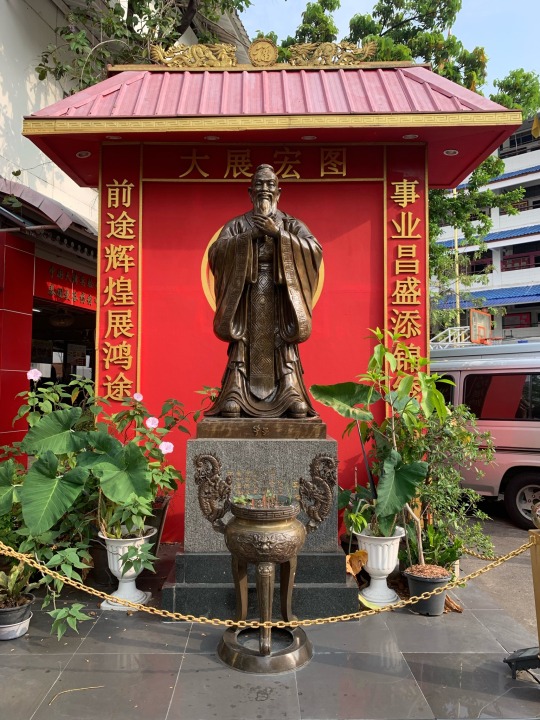
and a singularly elegant spirit house with a prang on top.

The non-random part of my walk was my one pre-determined destination: the Wat Traimit,

Temple of the Golden Buddha.

Now perhaps, if you���ve been keeping up with this blog, this must be a temple of a golden Buddha since you've already seem more than your fair share of golden Buddhas. Ah, but here’s the difference. All the other golden Buddhas were made of other materials and then covered with gold leaf. This particular Buddha is solid gold, 15’9” high and 12’5” wide, weighing 5.5 tons … of solid gold. In times of invasion, the statue was covered with plaster so that it would look less valuable than it was.
In time, since the statue looked as though it was merely made of plaster, people forgot what was inside. Only in 1955, when there were plans to move the statue from another site to here at the Wat Traimit, did some of the plaster fall off, and it became clear that underneath a shallow façade was a virtual mountain of gold.
And today, if you like, you can buy a pre-packaged bottle of holy water at the temple for only twenty baht.

After visiting the Golden Buddha, I returned to the hotel for breakfast, a shower, and a brief rest before checking out.
The second part of the day has not yet occurred, but I need to post this entry now while I have access to the Internet. Since I’ve yet to experience Thai massage or, for that matter, any massage in Southeast Asia, I've booked a few hours in a spa this afternoon between my check-out time and my departure for the airport. Thai massage is one of the things that people often talk about after visiting Bangkok, and I have a few empty hours on my hands, so …
When booking the appointment I told them that my spa visit would occur shortly before a thirty-hour flight back home, so I wanted to feel “clean and refreshed but also relaxed.” They assured me they have “just the thing.” (When do businesses not have “just the thing” when you make an inquiry?) I'll be in for a body cleanse and scrub, followed by a gentle aromatherapy massage.
We’ll see how that goes. If you truly want to know, ask me in person sometime.
Now, the third part of my day will be to engage in a bit of post-trip reflection. And I've already given that topic a lot of thought during my walkabout this morning. So, here goes.
This experience in Southeast Asia was one of my long-term goals. You might even say it was a life goal. At least, it was something I'd talked about for years and felt I absolutely needed to do. So, life goal accomplished!
But here's the funny thing about life goals. Once you achieve them, you have mixed feelings. On the one hand, there's a major sense of accomplishment. On the other, it feels as though a milestone in life has now past, and you wonder whether there will ever be other goals that you’ll long for quite that much. Not to exaggerate, but it feels as though a part of your life is now over and that you’ve passed one more signpost on the road toward mortality.
I remind myself that I’d had similar feelings before. When I was very young, my life goal had been to get a Ph.D. and become a college professor. (Seriously. I remember telling people this as early as fifth grade.) Then, when I was 26 and had achieved that goal, I thought, “Well, now what?”
Other goals came along, of course. There was a period when, if people asked whether I had a “bucket list,” I’d say, “I want to do three things. See the pyramids in Egypt, visit Kyoto, and attend the Wagner festival at Bayreuth.” Then, by a strange turn of fate, I did all three of those things within the same six-month period and again thought, “Now what?”
But there was always that Southeast Asia trip left for me to plan. So, now it's over. Okay, now what?
The honest answer is “I don’t know” but also “I’m sure I’ll think of something. I always have.”
As this trip comes to an end, I find myself reminded of that article I mentioned on Day Nine: “The Case Against Travel.” The author’s argument was that people always say they travel because travel changes them, but everyone returns from a trip no different from the person they were before setting out.
So, am I the same person I was before this trip?
Absolutely.
But I don’t really think that’s the point. Certainly, there can be zen-like, blinding flashes of insight during a trip, like a flash of gold appearing from beneath a thin façade of plaster. I already mentioned once being in Rome and realizing, “Oh! That’s what Horace meant in his poetry!” and never seeing his works in the same way again. But those experiences are rare.
More often, travel changes you slowly over time. You don’t see those changes in a single day, a single week, or even a single year. Rather it’s like the slow polishing of a stone into a statue. It takes time. It happens almost imperceptibly. And eventually you realize that you actually aren’t the same person you were before. You’ve broadened your perspective, left behind a few assumptions, and made connections between ideas you never would've made before.
That’s a good thing.
No. I'm wrong.
That’s a great thing.
In fact, as far as I’m concerned, it’s one of the best things a person can do.
And I wonder where I’ll go next and how that experience might change me.
I can't wait.
3 notes
·
View notes
Text

(via @publicdomainbooksdevotee )
My Latin is pretty rusty, but I know enough to say that it's a bunch funnier, so let me take a stab at translating. I'm breaking down the original so if I make any ridiculous mistakes through not having taken Latin in 15+ years, other people can correct me.
"Salvete, Gaius Iuli'us Caesar sum" -- Greetings, all! I am Gaius Julius Caesar
"et pilorum album quam nivem habeo et aureos," -- and I have spears that are whiter than snow and golden
"sed interdum virides lauros" -- but sometimes green laurels
"et imperium Romanum construxi" -- and I built the Roman empire
"et eius eram quasi primus Caesar (sic merui nomen meum)" -- and I was, like, its first Caesar (that's how I got my name) [note: a more literal translation is "thus I earned my name", but it's obvious that this is a direct reference to the line "that's how I got my name" in the original]
"et multi indicant mihi me Marcus Crassus similem esse (si non scitis Marcus Crassus, vobis opus est pecunia)." -- and many people say to me that I seem to be like Marcus Crassus (if you don't know Marcus Crassus, your work is money). [translator's note: "your work is money" is not a phrase I'm familiar with. Google Translate suggests "you need money" as a more idiomatic translation. My best guess is it might mean something like "you work for your money instead of being a patrician with a family inheritance".]
"Brutus non est filius meus quod est bonum nam ET TU, MI FILI???!?." -- Brutus is not my son, which is good because AND YOU, MY SON???!? [note: this is the more classically attested version of Caesar's last words, famously quoted in English as "et tu, Brute?" or "and you [are killing me too], Brutus?"
"Iamia sum sed dentes albos et rectos habeo." -- I am a [vampire?] but I have white and straight teeth. [note: I'm more familiar with the Lamia as a Greek female monster similar to Scylla but with only one neck. However, Google Translate's suggestion of "vampire" seems likely accurate from the obvious context.]
"Pallidam cutem habeo." -- I have pale skin.
"Etiam, maga sum magicum ludum, nomine Pigverruca, visitans quod desinam (ego sum MMCXIV), veni, vidi, vici." -- Also, I am a female witch [at?] a magic school, named Hogwarts, which I will stop visiting (I am 2094), I came, I saw, I conquered." [note: "Veni, vidi, vici" is famously what Caesar said when deciding to bring his army to Rome and become its ruler.]
"Classicus sum (si vos id non suspexistis) et multas togas emptas in Basilica Iulia habeo." -- I am classical (if you didn't know) and I have bought many togas in the Julian Basilica.
"Ratio amo et bellum Gallicum gero." -- I love reason and I conduct the Gallic [French] wars.
"Veluti, hodie omnia Gallia occupata. Omnia Gallia? Certe!" -- As if, today all Gaul is occupied. All Gaul? Definitely!
"Non est vicus parvus inter Aquarium, Babaorum, Laudanum et Brevisbonum." -- It is not a small village between Aquarium [pun: fish tank], Babaorum [pun: rum cake], Laudanum [pun: opium product] and Short Good.
"Ambulabam foris Pigverruca." -- I was walking outside Hogwarts.
"Ninxit et pluvit et Gallia divisa erat in partes tres, quod me fecit felix." -- It snowed and rained and Gaul was divided into three parts, which made me happy. [note: Caesar's history of the Gallic Wars famously begins "Gaul is divided into three parts".]
"Marcus Porcius Cato me observavit. Digitum medium illo monstravi." -- Marcus Porcius Cato [the Younger, a famous opponent of Caesar's ambitions] stared at me. I put my middle finger up at him."
Salvete, Gaius Iuli'us Caesar sum et pilorum album quam nivem habeo et aureos, sed interdum virides lauros et imperium Romanum construxi et eius eram quasi primus Caesar (sic merui nomen meum) et multi indicant mihi me Marcus Crassus similem esse (si non scitis Marcus Crassus, vobis opus est pecunia). Brutus non est filius meus quod est bonum nam ET TU, MI FILI???!?. Iamia sum sed dentes albos et rectos habeo. Pallidam cutem habeo. Etiam, maga sum magicum ludum, nomine Pigverruca, visitans quod desinam (ego sum MMCXIV), veni, vidi, vici. Classicus sum (si vos id non suspexistis) et multas togas emptas in Basilica Iulia habeo. Ratio amo et bellum Gallicum gero. Veluti, hodie omnia Gallia occupata. Omnia Gallia? Certe! Non est vicus parvus inter Aquarium, Babaorum, Laudanum et Brevisbonum. Ambulabam foris Pigverruca. Ninxit et pluvit et Gallia divisa erat in partes tres, quod me fecit felix. Marcus Porcius Cato me observavit. Digitum medium illo monstravi.
26K notes
·
View notes
Text
Captain's Log #5

Yeah, I'm already back.
I started a new bout of isolation a few days ago. It's not going good or badly so far. I'm mostly at calm.
As far as that real feeling I was talking about a few days back—still there, less enjoyable now. I'm finally feeling a dearth of vitality and motivation—likely connected to running out of gabapentin (again). But I'll be fine.
I still have not made any serious headway into ASF. Editing is a disaster. My main conclusion is that it's simply laziness and a lack of discipline, but that has never been an issue for me when it comes to writing before, and thus I feel it's likely something deeper that I just cannot place at the moment.
I sent my last CL to a few people I thought would relate and all of them, without fail, ignored it. One person didn't even acknowledge I had sent them anything. Unsurprisingly, this precipitated me dipping out. I used to get really upset over this sort of thing, vulnerability being punished (i.e. ignored) like that. It still bothers me these days, but honestly, it's a good way to find out who you want to forever close off from that part of you.
You get a certain number of chances to do this to me before you are dead to me. "How are you" now wields "Fine" instead of how I'm actually doing, because nobody cares how I'm actually doing. Or maybe I should just say "read TMT if you want to know."
Anyway, so far this CL has been prelude to the main reason I'm writing this, which is that while I do enjoy the "real" feeling, I'm feeling a bit listless—adrift. For the past few years, writing has been that push giving me purpose. It's been what keeps me ticking.
I have a lot of love for writing. It is in my blood. It's the one thing I know that I will do from now until I die, be that as I finish this sentence or in 60 years (but, in all honestly, I'll probably purchase for myself a nice Colt .45 and make an end of it before I ever get that far).
But with whatever it is waylaying me in editing, I feel kind of... I don't know. I tend to divide chapters of my life two ways: first by season, second by whatever project I'm working on at the time. And ostensibly it's ASF, but I'm doing fuck all.
I tried a few things to get my motivation back. One of them was taking phenibut. Just played New Vegas all day instead. Another was keeping a consistent 4-AM-wakeup sleeping schedule. I actually had less motivation doing that. So then I tried 9 AM. Better, but still not great.
It's frustrating. I don't know what's gotten into me. I can't make myself do anything. And it's not the taper, because I'm like this both on and off of baclofen/phenibut/gabapentin/whatever. Nothing I take works.
For a while I thought it was just PAWS from amphetamine withdrawal, but it's been five years since I last took any, and probably about seven since I was physically reliant on it. So what is going on in my idiotic brain?
No clue. Hopefully it's just that I need to rest after the chaos of July with my sister dropping dead and everything. But it's been three months, so that excuse seems thin at best.
Gaul was pacified, but not at once, I guess.
0 notes
Link
0 notes
Text
Gallia est omnis divisa in partes tres
(3 minutes read) ‘It was the commentators’ Waterloo, the prophets’ Berezina, and the forecasters’ disaster. Who’d have thought?’ (Ex-Libération editor, Laurent Joffrin, in his online Journal.) Classically-educated readers are all too well aware that ‘The whole of Gaul is divided into three parts’. [Apologies to those feeling I’ve had recourse to this tired old saw more than once too often: but…
0 notes
Text

A story so intense it's divided into TWO parts (unlike Gaul which is divided into three): the GodChosen series.
GodChosen
Twilight of the GodChosen
Available in iPub, paperback, audio, and boxset.
0 notes